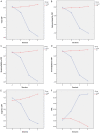Managing cancer and living meaningfully (CALM) as an intervention for severe fatigue in gastrointestinal cancer survivors
- PMID: 35812063
- PMCID: PMC9251694
Managing cancer and living meaningfully (CALM) as an intervention for severe fatigue in gastrointestinal cancer survivors
Abstract
This study aimed to evaluate the effectiveness and feasibility of CALM (managing cancer and living meaningfully), which is a psychotherapeutic intervention used to reduce cancer-related fatigue (CRF) and improve quality of life (QOL) in Chinese gastrointestinal cancer survivors (GCs). A total of 115 GCs were enrolled in this study. All patients were randomly assigned to either the CALM group or the usual care (UC) group. All patients were evaluated using the Piper Fatigue Scale (PFS) and Quality of Life Assessment Scale before and after 2, 4, and 6 CALM or UC sessions with GCs presenting with severe fatigue. We compared the differences in these scores between the CALM group and the UC group and analyzed the correlations between CRF and QOL scores. Compared with the UC group, the CALM group showed significant differences in total CRF, behavioral/daily life CRF, emotional/affective CRF, sensory/physical CRF, cognitive CRF and QOL scores before and after 2, 4, and 6 CALM sessions (F=3106.434, F=1113.831, F=1159.919, F=1502.266, F=820.275, F=606.513, respectively; P<0.001). Finally, negative correlations were found between CRF and QOL scores in the GCs in the CALM group (before treatment: r=-0.46, P=0.0002; after 2 sessions: r=-0.46, P=0.0002; after 4 sessions: r=-0.51, P<0.0001; after 6 sessions: r =-0.44, P=0.0004). The CALM intervention effectively reduced fatigue in cancer patients and improved their QOL. This study suggests that CALM as a psychotherapeutic intervention may be an effective way to reduce CRF.
Keywords: CALM; cancer-related fatigue; gastrointestinal cancer; quality of life.
AJCR Copyright © 2022.
Conflict of interest statement
None.
Figures




References
-
- Lin PJ, Belcher EK, Gilmore NJ, Hardy SJ, Xu H, Mustian KM. Common Issues in Breast Cancer Survivors. Springer; 2021. Cancer-related fatigue; pp. 153–168.
-
- Deb U, Mukhopadhyay S, Bhattacharya B, Banerjee S, Biswas S. Efficacy and safety of modafinil versus dexamethasone in cancer-related fatigue: a prospective randomized controlled study. Future Oncol. 2021;17:1735–1747. - PubMed
-
- McFarland DC, Bjerre-Real C, Alici Y, Breitbart WS. Cancer-related fatigue. Psycho-Oncol. 2021:265.
-
- Strasser F. Survivorship Care for Cancer Patients. Springer; 2021. Management of cancer-related fatigue; pp. 203–231.
-
- Fabi A, Bhargava R, Fatigoni S, Guglielmo M, Horneber M, Roila F, Weis J, Jordan K, Ripamonti CI. Cancer-related fatigue: ESMO clinical practice guidelines for diagnosis and treatment. Ann Oncol. 2020;31:713–723. - PubMed
LinkOut - more resources
Full Text Sources
